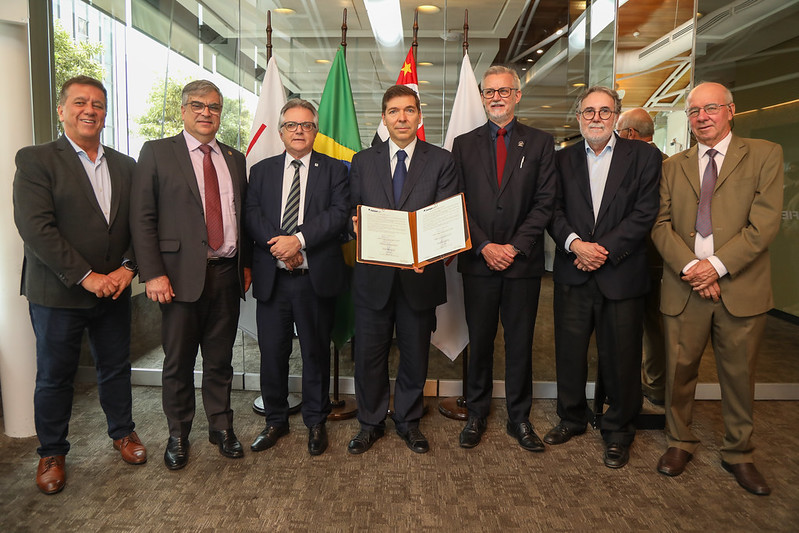


The project brings together researchers from USP, UNICAMP, UNESP and SENAI who will apply data science methods and techniques to practical problems proposed by industries in areas such as manufacturing, logistics and automation (photo: Karim Kahn/SESI/SENAI-SP)
Published on 04/23/2025
Agência FAPESP* – An agreement signed between FAPESP, the University of São Paulo (USP), the State University of Campinas (UNICAMP), São Paulo State University (UNESP), the Advanced Institute for Artificial Intelligence (AI2) and SENAI-SP (the São Paulo state branch of the National Industrial Training Service, a non-profit organization linked to the National Confederation of Industry – CNI) has sealed the operation of the Data Science for Smart Industry (CDI2) project.
One of the Applied Research Centers in Artificial Intelligence (ARC-AI) selected through a call for proposals launched by FAPESP in partnership with the Ministry of Science, Technology and Innovation (MCTI), the Ministry of Communications (MCom) and the Brazilian Internet Steering Committee (CGI.br), the CDI2 is a research unit dedicated to exploring and developing advanced data science and artificial intelligence solutions, with a focus on improving the efficiency, innovation and competitiveness of industries.
For Josué Gomes da Silva, president of the Federation of Industries of the State of São Paulo (FIESP) and SENAI-SP, in order to revive industry, in addition to macroeconomic measures, it is necessary to recover the capacity to innovate, and having universities generate knowledge is fundamental. “We need an industry that’s prosperous, innovative, decarbonized and integrated into value chains. This partnership strengthens SENAI,” he told the SENAI-SP communications department.
The project brings together researchers from universities and SENAI who will apply data science methods and techniques to practical problems proposed by industries in areas such as manufacturing, logistics and automation to optimize processes, predict trends and improve decision-making.
“FAPESP funds research of various types, but currently has a strong focus on innovation. Bringing SENAI into a partnership with universities is an important step in supporting innovation in São Paulo’s industry,” said Carlos Américo Pacheco, director-president of FAPESP’s Executive Board.
According to Carlos Gilberto Carlotti Junior, rector of USP, artificial intelligence is a relatively new tool that should be explored more with new perspectives and purposes. “Together, it’ll be much faster to transfer all the technology created by the universities and SENAI to the industries of São Paulo. I’m sure that industry will be able to compete internationally based on the knowledge generated,” he said.
Collaboration for innovative solutions
In addition to the agreement, documents were also signed establishing specific partnerships between SENAI-SP and each of the universities.
“This agreement is a major step forward in the relationship between the universities and SENAI. We have the same goals, which are the industrial, social and economic development of the country. Our partnership increases the connection between university and industry, for the benefit of society, which is, after all, who we work for,” said Pasqual Barretti, rector of UNESP.
The initiatives will bring together researchers from the institutions and industrial partners. Among the actions planned are workshops, the creation of collaborative networks and the sharing of laboratories to create an environment conducive to the development of innovative solutions.
The cooperation includes the training of students and professionals through joint research projects and training programs, with the aim of leveraging the transfer of knowledge and technologies to benefit the national industry.
“UNICAMP has a tradition of innovation, of generating patents. In this contact with SENAI, we want to facilitate the effective transformation of the technology developed into products that generate innovation in the industrial world,” concluded Antonio José de Almeida Meirelles, rector of UNICAMP.
*With information from SENAI-SP
Source: https://agencia.fapesp.br/54553